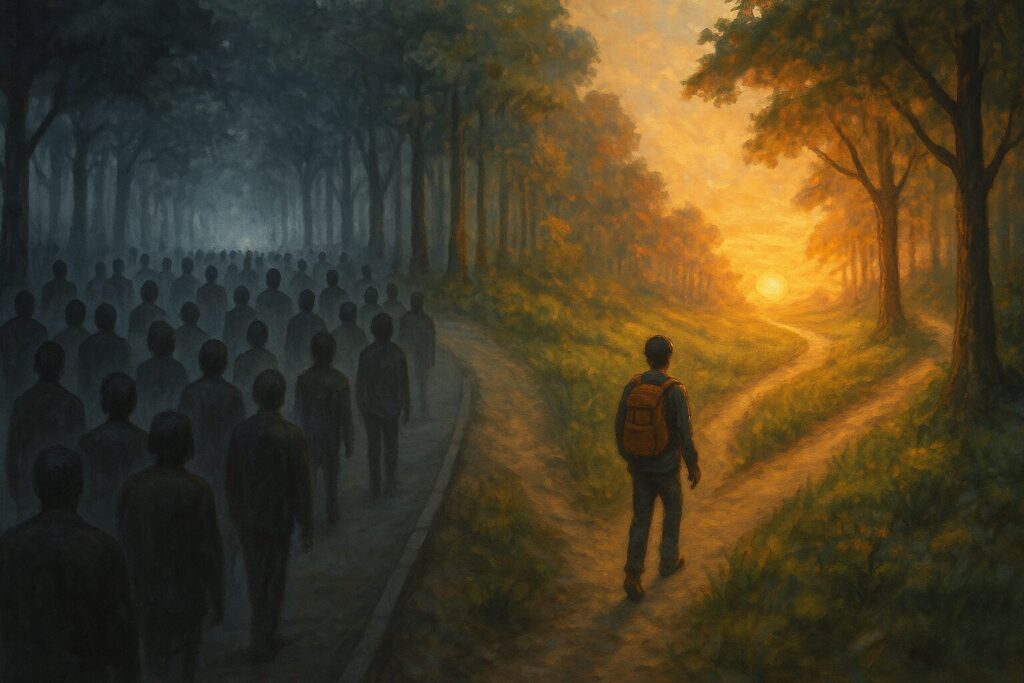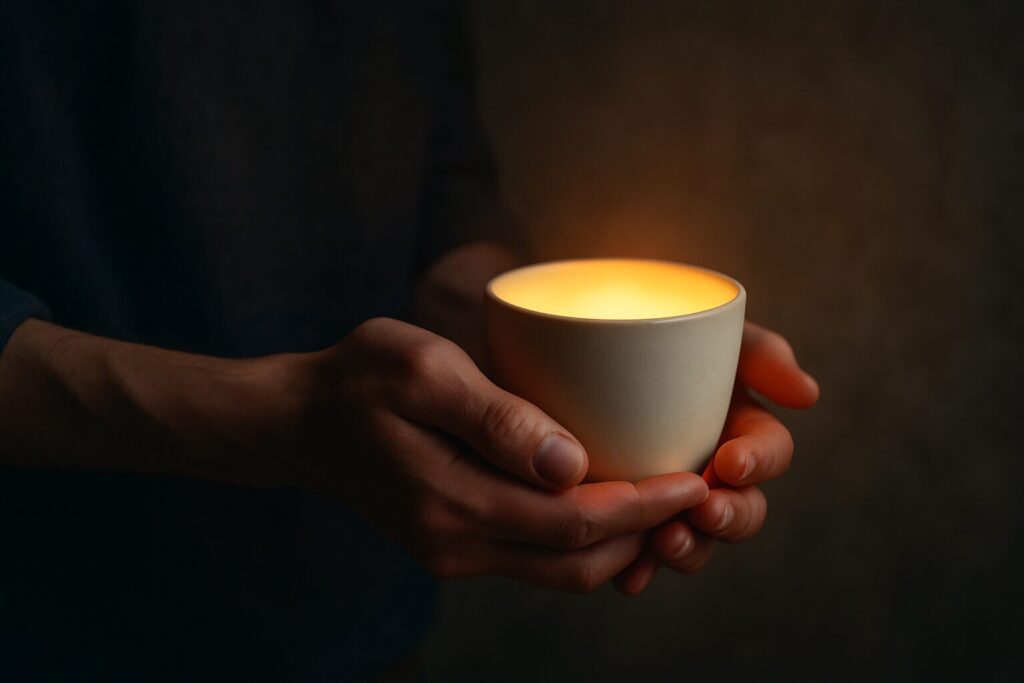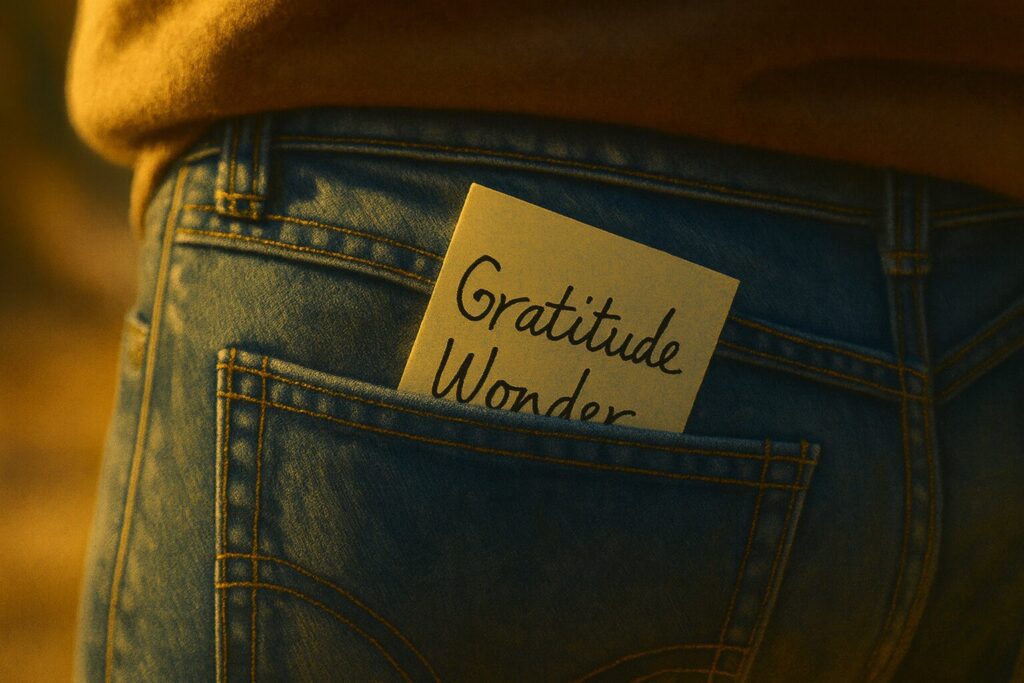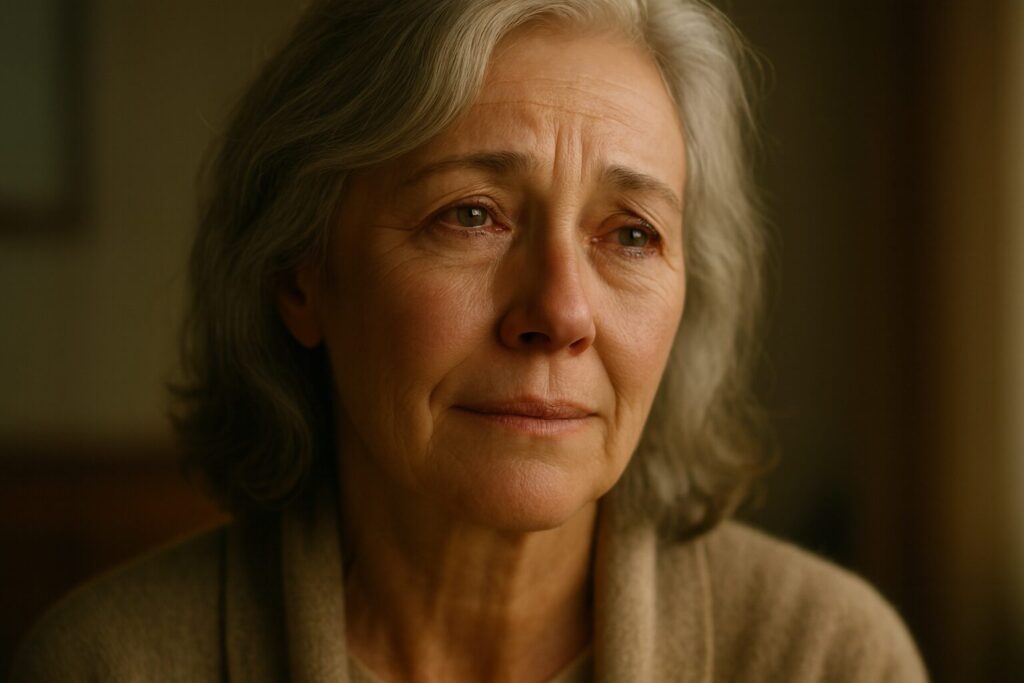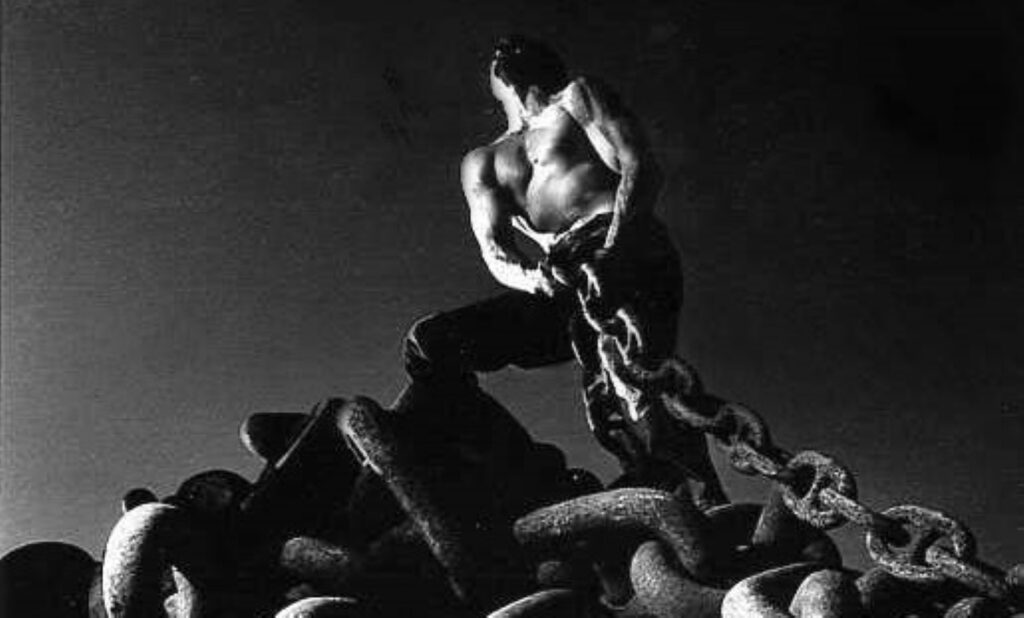Life Skills
We live in a culture that sells us on permanent positivity. Motivational posters, Instagram captions, self-help gurus — all whisper (or shout): “If you’re not happy, something is wrong with you.” But expecting perpetual happiness is unrealistic, and worse, it pressures us to fake it.
Managing Perspective
Life shrinks and expands depending on the frame we use. A small setback, viewed up close, feels like the end of the world. Pull back the frame, and the same event becomes a blip, a footnote in a larger story.
The Balancing Gift of Gratitude
Desire drives us. We strive, we chase, we imagine new possibilities. Without desire, civilization would stall. But desire alone can also leave us restless, always chasing the next horizon, always frustrated with the gap between what we have and what we want. That is where gratitude comes in. Not as a replacement for desire — but as its balance. Gratitude steadies us. It keeps us from mistaking every delay for despair. It reorients us toward the miracle that is already around us.
The Compass of Inner Authority
From the moment we’re born, voices crowd around us, telling us who we should be. Parents, teachers, bosses, influencers, friends. Some offer wisdom. Others project their fears. All of them create noise.
The Oasis and the Return
There are days when the world is a desert: glare, heat, no shade. On those days we don’t need pep talks; we need water. And part of staying sane is remembering that the water exists — even when we’re too tired to walk to it.
Balancing Life’s Opposites
We long for simplicity. If only life could be one thing — constant peace, endless joy, steady certainty. But life is not one thing. It is a symphony of opposites: quiet and noise, rest and striving, solitude and connection.
The Price of Independence
Independence is often celebrated in slogans. We hear lines about “being yourself” as if it were simple, even glamorous. But anyone who has tried knows: true independence has a price.
The Cup Metaphor
Life places a cup in our hands. We did not ask for it, and we cannot hold it forever. But while it’s ours, we face two tasks: to fill it and to savor it.
Honesty Over Airbrushing
Life is not airbrushed. It is jagged and uneven, full of moments that hurt so much they shatter our composure. To deny this reality isn’t strength. It’s alienation from our own humanity.
Soul Therapy: Technology On and Off
Technology is everywhere. It fills our pockets, our desks, our homes. Often it overwhelms us, leaving us jittery and distracted. Yet in the right measure, it can also heal. It can connect, soothe, and restore.
Independence vs. Isolation
Independence is often misunderstood as isolation. People imagine the independent person as cold, aloof, detached: someone who doesn’t need anyone, who refuses intimacy, who rejects community. But independence is not about pushing people away. It’s about standing on your own feet so that you can walk toward others freely.
Aesthetic Experience as a Reason for Living
We’ve all had days when life technically continued but felt empty, thin, almost pointless. Food was on the table, but appetite was gone. Time passed, but meaning was missing. In those seasons, we need more than existence. We need a reason to stay. For human beings, that reason often comes through aesthetic experience — the moments when life feels not only bearable but luminous, charged with significance.
Living Awake
Autopilot is efficient — but it is also deadly to the soul. Numbness can carry us through tasks, but it cannot help us savor existence. To live awake is to resist the drift. It is to say no to the anesthetic of familiarity, and yes to the shock of clarity.
The Back-Pocket Perspective
Life is not designed to be easy. It is turbulent, uneven, unpredictable. Some days feel like victory laps, others like collapse. To demand that we “always savor life” or “always feel grateful” is to set ourselves up for disillusionment. The truth is, no one can carry a sunlit perspective 24/7. And that’s okay. Because perspective doesn’t lose its value just because it isn’t always active. Sometimes, it’s enough to know that a helpful way of seeing the world is tucked in your back pocket, ready when you need it.
The Joy of Standing Alone
We’re wired to crave belonging. For most of human history, standing apart from the tribe meant danger, even death. So it’s no surprise that in the modern world, the thought of standing alone can make our hearts pound. Conformity whispers safety; independence feels risky. And yet, paradoxically, some of life’s richest joys come not from blending in, but from daring to stand apart. Independence isn’t only about hard duty or lonely burden. Sometimes, it feels like freedom in its purest form: exhilarating, life-affirming, joyful.
The Compass of Curiosity
Curiosity is honest. It ignores what we “should” want and pays attention to what we actually want to explore. That makes it a reliable compass for becoming ourselves. If we keep following the questions that quicken us, we end up in places that feel like home.
The Dignity of Sorrow
The same heart that swells with joy will eventually ache with grief. We can’t separate the two. To love is to open ourselves to loss, whether through distance, misunderstanding, or death itself. At first glance, sorrow seems like an intruder — an unwanted thief of joy. But in truth, sorrow is not a violation of life’s gift. It is part of what makes the gift so precious. If love gives us warmth, sorrow, at times, gives it depth.
Aesthetic Awareness Triad
You don’t need a cathedral to experience reverence. A cup of tea will do. You don’t need a symphony to hear hymns of praise. The sound of your own breath is enough. The question is simply: will you notice?
The Recuperation Station
We don’t live life on a straight, endless highway. We live it more like a long, winding trek — hills, valleys, storms, clearings. And no trek can be endured without stopping points along the way. That’s what a recuperation station is: a deliberate place or practice of renewal. It’s where we catch our breath, regain strength, and remind ourselves of why we’re moving forward at all.
Independence and Responsibility
Some people hear “independence” and imagine shirking accountability. They picture someone walking away from commitments, refusing ties, living “spontaneously.” But that’s not independence as much as it’s irresponsibility — the refusal to acknowledge the consequences of one’s choices. Independence is not the escape from chosen responsibility. It is the embrace of what we choose.
The Gift of Solitude
Modern life is allergic to silence. We fill every pause with screens, every walk with earbuds, every quiet moment with chatter. Alone time can feel threatening, as if stillness means emptiness. But solitude is not loneliness. Loneliness is the ache of absence; solitude is the gift of presence — presence with ourselves. When embraced, it becomes a fertile space for reflection, creativity, and restoration.
The Leap Into Potential
Potential feels intoxicating. It whispers: You could be great. You could write the book, launch the business, find the love, paint the canvas. Potential flatters us, because it suggests greatness without risk. But potential is not enough. A life can be heavy with possibility yet empty in reality. The tragedy is not wasted effort but wasted potential that never turned into anything lived.
Appreciating Fully
To live fully is not only to fill our cup. It is also to savor what’s already there. Without appreciation, even a rich life can feel empty. Without savoring, we gulp without tasting. Appreciation turns existence into experience. It transforms the ordinary into the extraordinary. It reminds us that the point of life is not just to accumulate, but to delight.
Fulfillment, Not Happiness, as Life’s True North
“Happiness” is one of those words everyone nods at but no one defines the same way. Some mean pleasure. Some mean comfort. Some mean the absence of pain. Others mean success or contentment. The trouble is, happiness is fickle. It shifts with circumstances, moods, even the weather. If we make it our compass, we end up chasing a moving target.
Fulfillment, Not Happiness, as Life’s True North Read More »
Invulnerability and Its Costs
On the surface, invulnerability sounds appealing. Who wouldn’t want to be untouchable by pain, safe from sorrow, immune to loss? If we could build walls high enough, armor thick enough, maybe we could glide through life without being hurt. But the dream of invulnerability carries hidden costs. Walls don’t just keep out pain. They also keep out joy.
The Mind’s Power to Treasure
Life does not automatically feel like a gift. Some days it feels like a burden. Bills pile up, health falters, friendships fray. In those moments, it is tempting to ask: What is there to be grateful for? But gratitude isn’t just a spontaneous feeling. It is an act of the mind. It is the power to see differently, to frame experience not only by what is missing but by what is present.
The Everyday Temptations of Conformity
Conformity appeals to something deep in us: the desire for safety. To walk with the herd feels secure. When everyone is moving in one direction, it’s tempting to go along, even if our heart whispers another way. And conformity can be comforting — for a while. To nod when others nod, to dress how others dress, to choose the path already mapped. It spares us conflict. It saves us from questions. But it also dilutes us.
The Courage to Be Human
We live under constant pressure to appear polished: flawless resumes, curated photos, carefully edited stories. The message is subtle but relentless: Don’t let them see the cracks. But the cracks are part of being human. To live authentically requires courage not to disguise them all. Courage, in this sense, is not only about heroism on battlefields or podiums. It’s about the daily bravery of letting ourselves be fully human — imperfect, vulnerable, unfinished.
Destination and Compass
Every traveler knows the difference between a destination and a compass. The destination tells you where you hope to end up. The compass keeps you moving in the right direction along the way. Life requires both. Without a destination, you drift. Without a compass, you get lost. Together, they give you clarity and confidence for the journey.
Given and Created Treasures
Life hands us treasures in two distinct ways. Some are given: they arrive without our effort, woven into the structure of existence itself. Others are created: they emerge from our own hands, imaginations, and labors. Together, these two streams make up the bounty of being alive.
The Mirage of Numbing
When life grows heavy, numbing calls to us like a mirage.
A drink to quiet the nerves. A screen to scroll the hours away. A purchase to fill the hollow. A burst of workaholism to silence the questions. For a moment, numbing seems to help. The ache dulls. The noise fades. But then the mirage evaporates, and we find ourselves not refreshed but emptier, further from the wellspring of life.
How Do We Stay Sane Enough to Love Life?
Okay, Mr. Life Savor: yes, life is a gift. But it’s also a trial. Bills come due, bodies ache, relationships fray, accidents strike, and headlines darken our minds. Even when fortune smiles, stress and worry find their way in. So the question arises: how do we stay sane enough to keep loving life?
The Weight of Expectations
We all know the feeling. Expectations press in like a fog, filling our head with shoulds and musts. A grade, a job title, a social standing. One misstep feels catastrophic, as if the whole life we’ve imagined will implode. Sometimes the cost of those expectations is devastating.
Follow Your Fascination
There are a million ideas out there about what to do with your life. Your parents have one. So do your friends, your boss, your culture. They’ll tell you what’s smart. What’s responsible. What’s impressive. But if you want a compass that points to something truly yours, try this one: follow your fascination.



